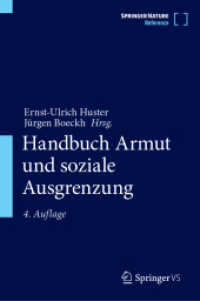- ホーム
- > 洋書
- > ドイツ書
- > Humanities, Arts & Music
- > Religion & Theology
- > christianity
Full Description
The challenge of methodic quality has haunted scholars in the human and social sciences since the end of the nineteenth century with the explosive and public success of the natural sciences and their precision and aim of controlling nature. The discussion has been dominated by the quest for proper scientific concepts and methods comparable to those employed in the natural sciences.
This book discloses the limits of scientific concepts and methods, and the failure of approaches in the human sciences emulating the scientific procedures in the natural sciences, notably the cognitive science of religion, to articulate religious life in its actuality. The author demonstrates on the basis of his own field research conducted among Buddhist monks in Sri Lanka and Orthodox monks and pilgrims on the Holy Mountain of Athos in Greece how preconceptions and historical belongingness determine interpretation. He argues that in the human sciences words matter more than concepts and propositions, and elucidates how words are revelatory of the authenticity of being, when the attitude adopted is that the view of the encountered other might be right.
In the conclusion the author identifies the methodic characteristics of hermeneutic reflection and proposes an analytic model for the human sciences that enables scholars to articulate the authenticity of actual life in words that reach the other.
Contents
Contents: The Challenge: the kind of knowledge of quality aimed at - The Uniqueness: humans possesses speech and words are revelatory of being - Beyond Methodic Truth: method as discernment and movement between concept and word - A Pilgrim among Pilgrims: the relation between subject matter and interpreter - Symbols: how historical belongingness determines interpretation - Towards a Method of Hermeneutic Reflection: the question of truth - The Method of Hermeneutic Reflection: Units and Universe, and the characteristics of hermeneutic reflection.








